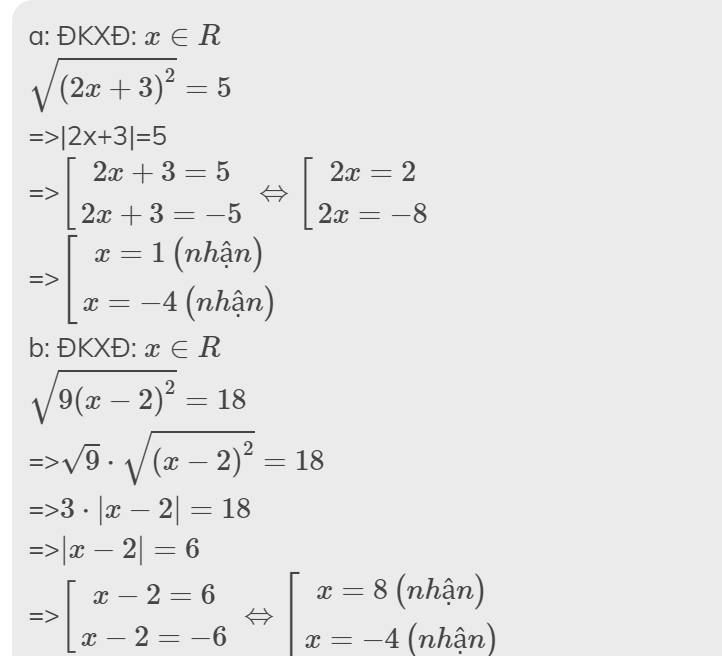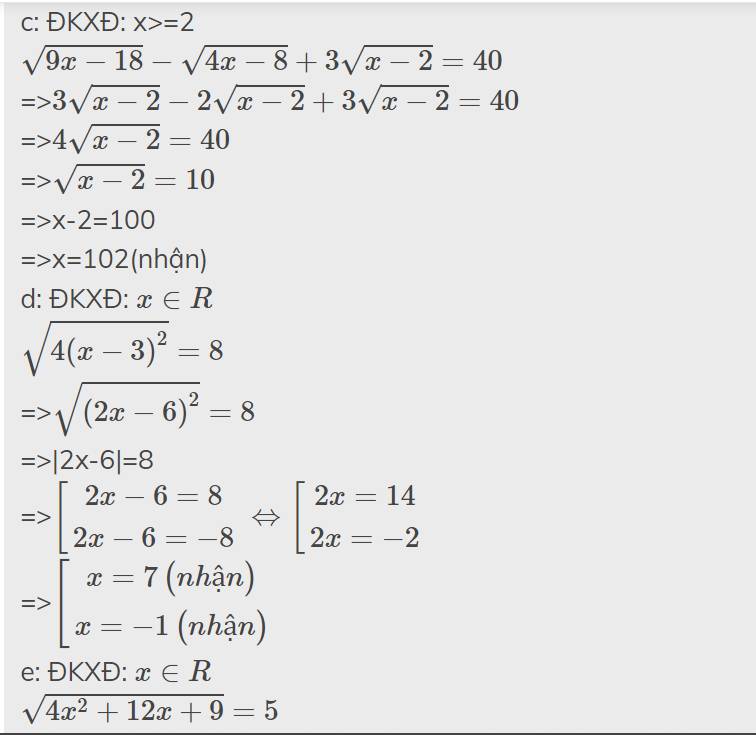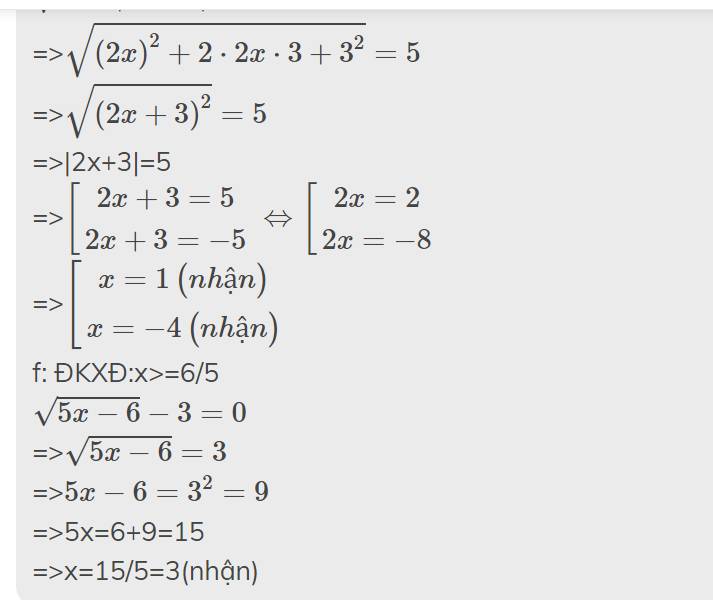Giải phương trình sau
\(x^2-2\sqrt{5}x+5=0
\)
\(4x^4-5x^2-9=0\)
Hãy nhập câu hỏi của bạn vào đây, nếu là tài khoản VIP, bạn sẽ được ưu tiên trả lời.


2:
a: =>2x^2-4x-2=x^2-x-2
=>x^2-3x=0
=>x=0(loại) hoặc x=3
b: =>(x+1)(x+4)<0
=>-4<x<-1
d: =>x^2-2x-7=-x^2+6x-4
=>2x^2-8x-3=0
=>\(x=\dfrac{4\pm\sqrt{22}}{2}\)

c) \(\dfrac{x}{x-2}+\dfrac{x}{x+2}=\dfrac{4x}{x^2-4}.ĐKXĐ:x\ne2;-2\)
<=>\(\dfrac{x\left(x+2\right)}{x^2-4}+\dfrac{x\left(x-2\right)}{x^2-4}=\dfrac{4x}{x^2-4}\)
<=>x2+2x+x2-2x=4x
<=>2x2-4x=0
<=>2x(x-2)=0
<=>\(\left[{}\begin{matrix}2x=0< =>x=0\\x-2=0< =>x=2\left(loại\right)\end{matrix}\right.\)
Vậy pt trên có nghiệm là S={0}
d) 11x-9=5x+3
<=>11x-5x=9+3
<=>6x=12
<=>x=2
Vậy pt trên có nghiệm là S={2}
e) (2x+3)(3x-4) =0
<=> \(\left[{}\begin{matrix}2x+3=0< =>x=\dfrac{-3}{2}\\3x-4=0< =>x=\dfrac{4}{3}\end{matrix}\right.\)
Vậy pt trên có tập nghiệm là S={\(\dfrac{-3}{2};\dfrac{4}{3}\)}
a) 5x+9 =2x
<=> 5x-2x=9
<=> 3x=9
<=> x=3
Vậy pt trên có nghiệm là S={3}
b) (x+1)(4x-3)=(2x+5)(x+1)
<=> (x+1)(4x-3)-(2x+5)(x+1)=0
<=>(x+1)(2x-8)=0
<=>\(\left[{}\begin{matrix}x+1=0< =>x=-1\\2x-8=0< =>2x=8< =>x=4\end{matrix}\right.\)
Vậy pt trên có tập nghiệm là S={-1;4}

1. \(\sqrt{x^2-4}-x^2+4=0\)( ĐK: \(\orbr{\begin{cases}x\ge2\\x\le-2\end{cases}}\))
\(\Leftrightarrow\sqrt{x^2-4}=x^2-4\)
\(\Leftrightarrow\left(x^2-4\right)^2=x^2-4\)
\(\Leftrightarrow\left(x^2-4\right)^2-\left(x^2-4\right)=0\)
\(\Leftrightarrow\left(x^2-4\right)\left(x^2-4-1\right)=0\)
\(\Leftrightarrow\orbr{\begin{cases}x^2=4\\x^2=5\end{cases}}\)
\(\Leftrightarrow\orbr{\begin{cases}x=\pm2\left(tm\right)\\x=\pm\sqrt{5}\left(tm\right)\end{cases}}\)
Vậy pt có tập no \(S=\left\{2;-2;\sqrt{5};-\sqrt{5}\right\}\)
2. \(\sqrt{x^2-4x+5}+\sqrt{x^2-4x+8}+\sqrt{x^2-4x+9}=3+\sqrt{5}\)ĐK: \(\hept{\begin{cases}x^2-4x+5\ge0\\x^2-4x+8\ge0\\x^2-4x+9\ge0\end{cases}}\)
\(\Leftrightarrow\sqrt{x^2-4x+5}-1+\sqrt{x^2-4x+8}-2+\sqrt{x^2-4x+9}-\sqrt{5}=0\)
\(\Leftrightarrow\frac{x^2-4x+4}{\sqrt{x^2-4x+5}+1}+\frac{x^2-4x+4}{\sqrt{x^2-4x+8}+2}+\frac{x^2-4x+4}{\sqrt{x^2-4x+9}+\sqrt{5}}=0\)
\(\Leftrightarrow\left(x-2\right)^2\left(\frac{1}{\sqrt{x^2-4x+5}+1}+\frac{1}{\sqrt{x^2-4x+8}+2}+\frac{1}{\sqrt{x^2}-4x+9+\sqrt{5}}\right)=0\)
Từ Đk đề bài \(\Rightarrow\frac{1}{\sqrt{x^2-4x+5}+1}+\frac{1}{\sqrt{x^2-4x+8}+2}+\frac{1}{\sqrt{x^2}-4x+9+\sqrt{5}}>0\)
\(\Rightarrow\left(x-2\right)^2=0\)
\(\Leftrightarrow x=2\left(tm\right)\)
Vậy pt có no x=2

1. 3x( x - 2 ) - ( x - 2 ) = 0
<=> ( x-2).(3x-1) = 0 => x = 2 hoặc x = \(\dfrac{1}{3}\)
2. x( x-1 ) ( x2 + x + 1 ) - 4( x - 1 )
<=> ( x - 1 ).( x (x^2 + x + 1 ) - 4 ) = 0
(phần này tui giải được x = 1 thôi còn bên kia giải ko ra nha )
3 \(\left\{{}\begin{matrix}\sqrt{5}x-2y=7\\\sqrt{5}x-5y=10\end{matrix}\right.\)<=> \(\left\{{}\begin{matrix}y=-1\\x=\sqrt{5}\end{matrix}\right.\)
\(1. 3x^2 - 7x +2=0\)
=>\(Δ=(-7)^2 - 4.3.2\)
\(= 49-24 = 25\)
Vì 25>0 suy ra phương trình có 2 nghiệm phân biệt:
\(x_1\)=\(\dfrac{-\left(-7\right)+\sqrt{25}}{2.3}=\dfrac{7+5}{6}=2\)
\(x_2\)=\(\dfrac{-\left(-7\right)-\sqrt{25}}{2.3}=\dfrac{7-5}{6}=\dfrac{1}{3}\)

c: Ta có: \(\sqrt{x-1}+\sqrt{9x-9}-\sqrt{4x-4}=4\)
\(\Leftrightarrow2\sqrt{x-1}=4\)
\(\Leftrightarrow x-1=4\)
hay x=5
e: Ta có: \(\sqrt{4x^2-28x+49}-5=0\)
\(\Leftrightarrow\left|2x-7\right|=5\)
\(\Leftrightarrow\left[{}\begin{matrix}2x-7=5\\2x-7=-5\end{matrix}\right.\Leftrightarrow\left[{}\begin{matrix}x=6\\x=1\end{matrix}\right.\)
a. ĐKXĐ: $x\in\mathbb{R}$
PT $\Leftrightarrow \sqrt{(x-2)^2}=2-x$
$\Leftrightarrow |x-2|=2-x$
$\Leftrightarrow 2-x\geq 0$
$\Leftrightarrow x\leq 2$
b. ĐKXĐ: $x\geq 2$
PT $\Leftrightarrow \sqrt{4}.\sqrt{x-2}-\frac{1}{5}\sqrt{25}.\sqrt{x-2}=3\sqrt{x-2}-1$
$\Leftrightarrow 2\sqrt{x-2}-\sqrt{x-2}=3\sqrt{x-2}-1$
$\Leftrightarrow 1=2\sqrt{x-2}$
$\Leftrightarrow \frac{1}{2}=\sqrt{x-2}$
$\Leftrightarrow \frac{1}{4}=x-2$
$\Leftrightarrow x=\frac{9}{4}$ (tm)

1) \(\sqrt[]{9\left(x-1\right)}=21\)
\(\Leftrightarrow9\left(x-1\right)=21^2\)
\(\Leftrightarrow9\left(x-1\right)=441\)
\(\Leftrightarrow x-1=49\Leftrightarrow x=50\)
2) \(\sqrt[]{1-x}+\sqrt[]{4-4x}-\dfrac{1}{3}\sqrt[]{16-16x}+5=0\)
\(\Leftrightarrow\sqrt[]{1-x}+\sqrt[]{4\left(1-x\right)}-\dfrac{1}{3}\sqrt[]{16\left(1-x\right)}+5=0\)
\(\)\(\Leftrightarrow\sqrt[]{1-x}+2\sqrt[]{1-x}-\dfrac{4}{3}\sqrt[]{1-x}+5=0\)
\(\Leftrightarrow\sqrt[]{1-x}\left(1+3-\dfrac{4}{3}\right)+5=0\)
\(\Leftrightarrow\sqrt[]{1-x}.\dfrac{8}{3}=-5\)
\(\Leftrightarrow\sqrt[]{1-x}=-\dfrac{15}{8}\)
mà \(\sqrt[]{1-x}\ge0\)
\(\Leftrightarrow pt.vô.nghiệm\)
3) \(\sqrt[]{2x}-\sqrt[]{50}=0\)
\(\Leftrightarrow\sqrt[]{2x}=\sqrt[]{50}\)
\(\Leftrightarrow2x=50\Leftrightarrow x=25\)
1) \(\sqrt{9\left(x-1\right)}=21\) (ĐK: \(x\ge1\))
\(\Leftrightarrow3\sqrt{x-1}=21\)
\(\Leftrightarrow\sqrt{x-1}=7\)
\(\Leftrightarrow x-1=49\)
\(\Leftrightarrow x=49+1\)
\(\Leftrightarrow x=50\left(tm\right)\)
2) \(\sqrt{1-x}+\sqrt{4-4x}-\dfrac{1}{3}\sqrt{16-16x}+5=0\) (ĐK: \(x\le1\))
\(\Leftrightarrow\sqrt{1-x}+2\sqrt{1-x}-\dfrac{4}{3}\sqrt{1-x}+5=0\)
\(\Leftrightarrow\dfrac{5}{3}\sqrt{1-x}+5=0\)
\(\Leftrightarrow\dfrac{5}{3}\sqrt{1-x}=-5\) (vô lý)
Phương trình vô nghiệm
3) \(\sqrt{2x}-\sqrt{50}=0\) (ĐK: \(x\ge0\))
\(\Leftrightarrow\sqrt{2x}=\sqrt{50}\)
\(\Leftrightarrow2x=50\)
\(\Leftrightarrow x=\dfrac{50}{2}\)
\(\Leftrightarrow x=25\left(tm\right)\)
4) \(\sqrt{4x^2+4x+1}=6\)
\(\Leftrightarrow\sqrt{\left(2x+1\right)^2}=6\)
\(\Leftrightarrow\left|2x+1\right|=6\)
\(\Leftrightarrow\left[{}\begin{matrix}2x+1=6\left(ĐK:x\ge-\dfrac{1}{2}\right)\\2x+1=-6\left(ĐK:x< -\dfrac{1}{2}\right)\end{matrix}\right.\)
\(\Leftrightarrow\left[{}\begin{matrix}2x=5\\2x=-7\end{matrix}\right.\)
\(\Leftrightarrow\left[{}\begin{matrix}x=\dfrac{5}{2}\left(tm\right)\\x=-\dfrac{7}{2}\left(tm\right)\end{matrix}\right.\)
5) \(\sqrt{\left(x-3\right)^2}=3-x\)
\(\Leftrightarrow\left|x-3\right|=3-x\)
\(\Leftrightarrow x-3=3-x\)
\(\Leftrightarrow x+x=3+3\)
\(\Leftrightarrow x=\dfrac{6}{2}\)
\(\Leftrightarrow x=3\)



a: \(\Leftrightarrow\left(x-\sqrt{5}\right)^2=0\)
\(\Leftrightarrow x-\sqrt{5}=0\)
hay \(x=\sqrt{5}\)
b: \(\Leftrightarrow4x^4-9x^2+4x^2-9=0\)
\(\Leftrightarrow4x^2-9=0\)
=>x=3/2hoặc x=-3/2